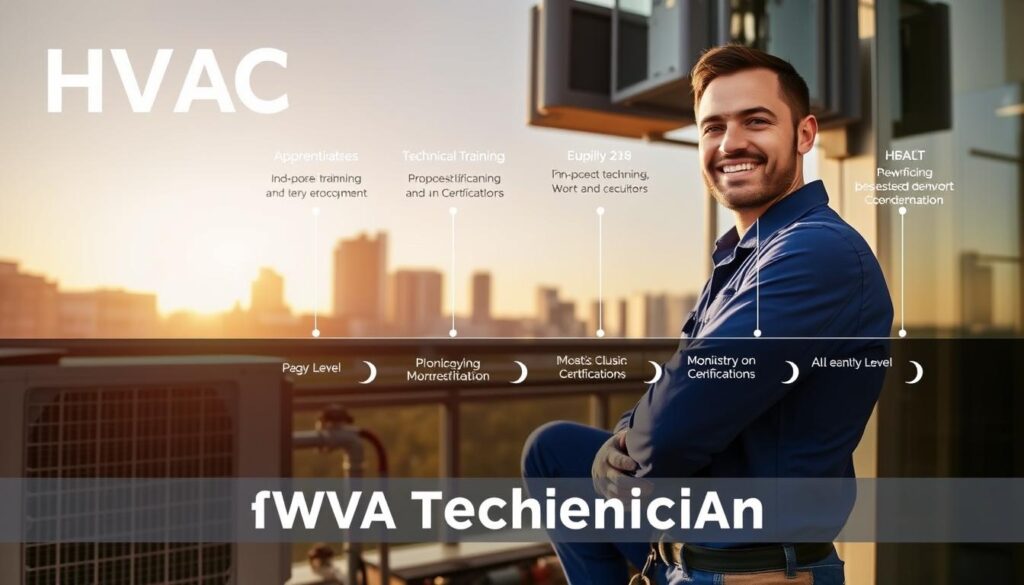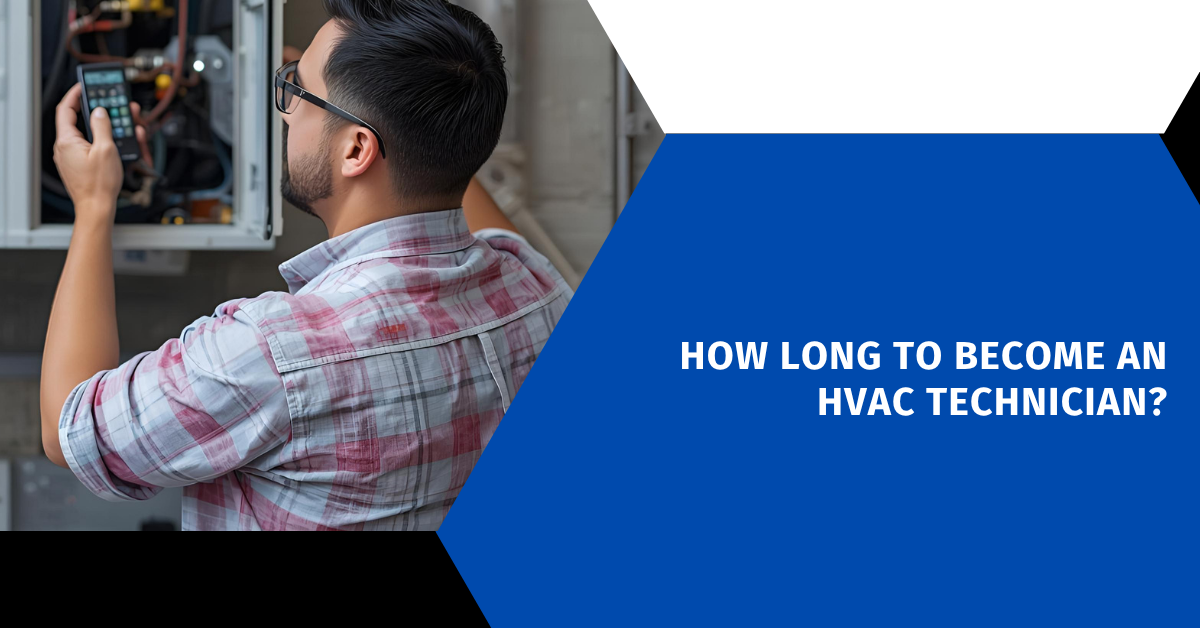Affiliate Disclosure
HVAC Guide Guys is a participant in the Amazon Services LLC Associates Program, an affiliate advertising program designed to provide a means for sites to earn advertising fees by advertising and linking to Amazon.
How Long to Become an HVAC Technician? Are you wondering how fast you can become an in-demand HVAC technician? The journey to becoming an HVAC pro is quicker and more accessible than you might think.

The time it takes to become an HVAC technician varies based on a few important factors. You’ll need a mix of education, training, and certification. Your path could be as short as 6 months or as long as 4 years, depending on your chosen educational route.
There’s flexibility in becoming an HVAC technician, making it easier for people with different backgrounds and learning styles to join. You can start your career with certificate programs, apprenticeships, or associate degrees. Each option offers a way to begin your HVAC journey.
Key Takeaways
- HVAC technician training can be completed in as little as 6 months
- Multiple educational paths are available for aspiring technicians
- Certification and hands-on experience are key to success
- Career opportunities in HVAC are growing fast
- Apprenticeship programs provide valuable practical learning
Table of Contents
Understanding the HVAC Career Path Timeline
Starting an HVAC career is exciting for those who love technical skills and hands-on work. The time it takes to complete your training varies. It usually ranges from 6 to 18 months, depending on your educational choice.
Exploring HVAC tech education requirements is key. There are different paths to becoming a technician. Each path has its own benefits and prepares you well for a career in HVAC.
Educational Pathways for HVAC Professionals
- Certificate Programs: Shortest route (6-12 months)
- Diploma Programs: Offers thorough training (9-15 months)
- Associate Degree: Provides deep technical knowledge (2 years)
- Apprenticeship: Combines work and learning (3-5 years)
Certification Requirements
Getting certified is a big part of your HVAC career. You must get the Environmental Protection Agency (EPA) Section 608 Certification. This is needed for working with refrigerants. You’ll need to pass a test to show you know about environmental rules and safe practices.
Industry Career Prospects
The HVAC industry is growing, with lots of job openings. The Bureau of Labor Statistics says there will be a 5% increase in HVAC technician jobs by 2029. This means great career chances for skilled workers.
Invest in your education and certifications to unlock a rewarding technical career with multiple advancement paths.
Explore Our HVAC Shop
Looking for top-rated HVAC tools, parts, and accessories? Visit our shop and find the perfect solution for your needs.
Visit the ShopHow Long to Become an HVAC Technician: Complete Timeline
Figuring out how long it takes to become an HVAC technician depends on a few key things. Your educational path is a big factor. It will affect how long you’ll be in training and your entry into this exciting field.
The time it takes to become an HVAC technician varies. It depends on the path you choose:
- Certificate Program: 6-12 months
- Diploma Program: 9-15 months
- Associate Degree: 2 years
- Apprenticeship: 3-5 years
Each path has its own benefits for those wanting to be HVAC pros. Your choice will depend on your goals, how much time you have, and what you want to achieve in your career.
| Education Path | Duration | Key Benefits |
|---|---|---|
| Certificate Program | 6-12 months | Fastest entry into workforce |
| Diploma Program | 9-15 months | Comprehensive technical training |
| Associate Degree | 2 years | Advanced knowledge and possible management roles |
| Apprenticeship | 3-5 years | Paid on-the-job training with classroom learning |
Keep in mind, learning never stops in the HVAC world. Getting certifications, specialized training, and keeping up with new tech will help you grow in your career.
Explore Our HVAC Shop
Looking for top-rated HVAC tools, parts, and accessories? Visit our shop and find the perfect solution for your needs.
Visit the ShopCertificate vs. Diploma Programs Duration
When you’re looking into a career in HVAC, knowing your options is key. The time it takes to get certified or earn a diploma varies. Each path has its own benefits for those wanting to dive into the HVAC trade.
Choosing the right program is important. It affects how fast you learn HVAC skills and your job prospects. Let’s look at the main differences between certificate and diploma programs.
Certificate Program Essentials
Certificate programs are a fast way to start in HVAC. They last from 6 to 12 months. This makes them great for those who want to get started quickly.
- Shorter duration (6-12 months)
- Concentrated technical training
- Cost-effective option
- Faster path to entry-level positions
Comprehensive Diploma Program Journey
Diploma programs take longer, lasting 9 to 15 months. They give a deeper dive into HVAC technology and skills.
- Extended training period (9-15 months)
- More extensive curriculum
- Deeper technical knowledge
- Enhanced career preparation
Program Comparison and Strategic Benefits
Your choice depends on your career goals and personal situation. Certificate programs get you in fast. Diploma programs offer more training and might lead to better jobs later.
“The right HVAC training program can be the foundation of a successful technical career.” – Industry Expert
Think about your time, money, and career goals when picking between certificate and diploma programs. Each path has its own benefits for becoming a skilled HVAC technician.
Associate Degree Path in HVAC Technology

An associate degree in HVAC technology is a great way to become an HVAC technician. This two-year program gives you deep knowledge and skills needed for the HVAC field. You’ll learn through a mix of technical and general education courses.
The time it takes to become an HVAC technician with an associate degree is about 24 months. In this time, you’ll learn about:
- Advanced heating and cooling systems
- Electrical and mechanical principles
- Refrigeration technologies
- Energy efficiency techniques
Key advantages of pursuing an associate degree include:
- More in-depth technical education
- Greater chances for career growth
- Higher starting salaries
- Deeper understanding of HVAC systems
“An associate degree provides a solid foundation for long-term success in the HVAC industry” – HVAC Professional Magazine
Students will complete about 60-70 credit hours. This includes both practical training and classroom learning. Many schools offer flexible schedules to help you balance school with work or personal life.
Investing two years in an associate degree program makes you a strong candidate in the HVAC job market. You’ll have skills and knowledge that make you stand out from those with shorter programs.
Explore Our HVAC Shop
Looking for top-rated HVAC tools, parts, and accessories? Visit our shop and find the perfect solution for your needs.
Visit the ShopApprenticeship Programs: Length and Requirements
HVAC apprenticeship programs are a great way to learn the trade. They mix practical skills with theory. This gives you a solid path to becoming a skilled HVAC technician.
The length of an HVAC apprenticeship varies from 3 to 5 years. It depends on where you are and the program’s needs. You’ll get lots of hands-on experience, preparing you for a career in HVAC.
On-the-Job Training Hours
Your apprenticeship will focus on practical learning. You’ll get:
- 2,000 hours of practical work experience each year
- Direct supervision by experienced HVAC pros
- Exposure to different HVAC systems in homes and businesses
Classroom Instruction Requirements
Learning the HVAC trade isn’t just about doing. You’ll also get classroom time:
- 144 classroom hours every year
- Technical education on system design
- Safety and industry rules
- Advanced technical knowledge
Apprenticeship Completion Timeline
To finish your apprenticeship, you need:
- At least 4-5 years of training
- Passing written and practical tests
- Showing you know HVAC well
- Getting the right certifications
Pro Tip: Your hard work during the apprenticeship can really help your future in HVAC.
Essential HVAC Certifications and Licensing

Understanding the hvac certification timeline is key for those starting in HVAC. You’ll need specific certifications to prove your skills and knowledge.
The Environmental Protection Agency (EPA) Section 608 Certification is a big step. It shows you can work with refrigerants safely and legally.
- EPA Section 608 Certification Types:
- Type I: Small Appliances
- Type II: High-Pressure Appliances
- Type III: Low-Pressure Appliances
- Universal: Covers All Appliance Types
Getting ready for these certifications takes 4-8 weeks. You’ll learn about refrigerant handling, environmental laws, and technical details.
| Certification | Study Duration | Exam Cost |
|---|---|---|
| EPA Section 608 | 4-6 weeks | $50-$150 |
| NATE Certification | 6-8 weeks | $100-$250 |
| State-Specific License | Varies by state | $50-$300 |
After EPA, think about getting North American Technician Excellence (NATE) certifications. They show you’re really good at your job and open more doors.
“Certifications are your passport to a successful HVAC career” – HVAC Industry Expert
Remember, each state has its own rules for licenses. Make sure you follow your state’s laws to meet professional standards.
Explore Our HVAC Shop
Looking for top-rated HVAC tools, parts, and accessories? Visit our shop and find the perfect solution for your needs.
Visit the ShopPre-Apprenticeship Training Duration
Getting into HVAC needs a smart plan for your training. Pre-apprenticeship programs are key, giving you a deep dive into the trade before apprenticeships.
These programs last from 3 to 6 months. They lay the groundwork for those eager to learn HVAC. They prepare you for more in-depth training and show you what the industry is like.
Program Components
A typical pre-apprenticeship program includes:
- Basic technical skills training
- Safety protocol instruction
- Introduction to HVAC systems and equipment
- Fundamental mathematics and blueprint reading
- Basic electrical and mechanical system understanding
“Pre-apprenticeship training is your first real step into the HVAC world – it’s where your dreams meet reality.” – HVAC Industry Expert
Skills Development Timeline
In your pre-apprenticeship, you’ll learn essential skills for your career. The skills development follows this order:
- First Month: Basic theoretical knowledge and safety training
- Second Month: Hands-on introductory technical skills
- Third Month: Advanced system understanding and practical applications
- Fourth Month: Career preparation and industry insights
Spending 3-6 months in pre-apprenticeship training gives you a strong HVAC foundation. It makes your apprenticeship and career path more focused and successful.
Specialized HVAC Certifications Timeline
Getting advanced in HVAC can really help your career. Specialized certifications show you’re a pro in certain areas. This makes you stand out in a crowded field.
Looking to become an HVAC tech with extra skills? There are many paths to choose from. Getting these certifications usually takes 3-6 months of hard study and hands-on training.
- Green Technology Certification: All about energy-saving and eco-friendly HVAC systems
- Commercial Refrigeration Specialist: Deals with complex cooling systems for businesses
- Building Automation Systems: Certification for the latest tech in HVAC
Each certification needs different prep times and tech knowledge. You’ll need to put in 100-200 hours of study and practice to pass these tests.
Why get specialized HVAC certifications? They offer big benefits:
- They can make you earn more
- They make you more attractive to employers
- They boost your technical skills
- They give you an edge in the job market
The time it takes to get these certifications varies. It depends on your experience and the area you focus on. Usually, it takes 3-12 months to prepare and get these advanced certifications.
“Specialized certifications are the key to standing out in the HVAC industry.” – HVAC Professional Magazine
Career Advancement Opportunities and Timeframes
The HVAC career path timeline is full of chances for growth and specialization. As you move up in your HVAC technician career, many paths open up for those who are ambitious.
Your hvac career path timeline has several key stages:
- Entry-level technician (0-3 years)
- Intermediate technician (3-5 years)
- Senior technician (5-8 years)
- Supervisory or management roles (8-10 years)
Becoming an HVAC technician is just the start. You need to keep learning and improving your skills to move up.
| Career Stage | Typical Requirements | Potential Opportunities |
|---|---|---|
| Entry-Level | Basic certification | Residential/commercial service technician |
| Intermediate | Additional specialized certifications | Complex system installations |
| Senior Level | Advanced technical knowledge | Project management, technical training |
| Management | Leadership certifications | Operations management, business ownership |
Specialization areas can really boost your career. Think about:
- Commercial HVAC systems
- Industrial refrigeration
- Green technology installations
- Energy management systems
“The most successful HVAC professionals never stop learning and adapting to new technologies.” – HVAC Industry Expert
The HVAC industry is expected to grow 9% by 2033. This means your career has a bright future. Keep learning and improving to succeed in the long run.
Explore Our HVAC Shop
Looking for top-rated HVAC tools, parts, and accessories? Visit our shop and find the perfect solution for your needs.
Visit the ShopState-Specific Requirements and Training Variations
Getting into HVAC tech education can be tough because of big differences in states. Your path to getting certified might change a lot based on where you are and where you want to work.
Every state has its own rules for HVAC techs. This makes it hard for newbies to know what to do. The rules affect how long you need to train, what exams you must take, and what licenses you need.
- California requires 6,000 apprenticeship hours
- Texas mandates specific refrigeration certification
- New York has stricter continuing education requirements
- Florida requires EPA certification for all HVAC technicians
Before you start your HVAC career, look up what your state needs. Some places ask for extra training or have tougher exams.
| State | Training Hours | Certification Exam | Renewal Requirements |
|---|---|---|---|
| California | 6,000 hours | State-specific exam | Yearly continuing education |
| Texas | 4,000 hours | Technical knowledge test | 16 CE credits every 2 years |
| New York | 5,000 hours | Comprehensive licensing exam | 24 CE credits annually |
Your best move is to talk to your state’s licensing board. They can give you the latest info on what you need to do to become an HVAC tech in your area.
Conclusion
Exploring how long to become an HVAC technician shows many exciting paths. Your journey can take 6 months to 2 years, based on your education and goals. You can choose from certificate programs, associate degrees, or apprenticeships, making the HVAC career path flexible.
Each training option has its own benefits for entering the skilled trades. Technical colleges, community programs, and vocational schools offer detailed training. Your dedication to learning and skill-building will speed up your transition to becoming a professional HVAC technician.
The HVAC industry is growing, with many opportunities for those who are motivated. Planning your education carefully can help you move up in your career faster. By understanding local needs and continuing to learn, you can build a fulfilling career in HVAC technology.
Success in HVAC requires more than just technical skills. Being adaptable, always learning, and solving problems are key. Investing in your professional growth will lead to many career opportunities in the changing HVAC sector.

